Piedmont Electric Cooperative is a not for profit utility and does not earn profits in the sense that other businesses do. Instead, any margins, or revenues remaining after all expenses have been paid, are returned to the members in proportion to their usage of the co-op’s services through capital credit allocations and retirements. Capital credits represent each member’s share of the cooperative’s margins and ownership of the co-op.
Search unclaimed capital credits below.
Fill out form to claim your capital credit!
Designate a beneficiary of your capital credits.
Frequently Asked Questions
Current members will receive a bill credit for capital credits of less than $75.00 and a check for $75.00 or more. Former members will receive a check in the mail once their capital credit total reaches $75.00.
Because a cooperative is incorporated as a not-for-profit business owned by its members, it does not technically earn profits. Instead, any revenues over and above the cost of doing business are considered “margins.” These margins represent capital furnished by the members to the cooperative for use as operating capital. This capital allows your cooperative to finance operations and construction, with the intent that this capital will be retired or returned to you in later years. In addition. capital credits help keep rates lower by reducing the amount of funds that must be borrowed.
All members who purchase electricity during a year in which the cooperative posts margins earn capital credits based on how much electricity they purchase in that year. The more electric service you buy, the greater your capital credits account, although the percentage will remain the same. The sum of your payments for a year is multiplied by a percentage to determine the allocation of your capital credits.
The percentage of your total payment that is allocated as capital credits varies from year to year, depending upon the margins of the cooperative. Capital credits are allocated only for a year in which your cooperative earns margins. Since capital credits are a member’s share of the margins, no credits are allocated for a year when there are no margins.
Capital credits are calculated based upon a member’s electricity usage. Even if you used power from your cooperative for even one month, you will accumulate some capital credits when your cooperative earns margins in that year.
Allocated capital credits appear as an entry on the permanent financial records of the cooperative and reflect your equity or ownership in the cooperative. When capital credits are retired, a check or credit is issued to you. These payments generally are made to members after a specified time period.
No. Allocated capital credits may not be used to pay for electricity you use now. Your electric bill or payment is due now, whereas you may not be entitled to receive your capital credits for many years.
In order to be financially responsible, our Board of Directors will decide when to return, or retire, each year’s capital credits back to our members. Every December, we will notify you if you receive a capital credit that year.
The capital credits of a deceased member may be paid without waiting for a general retirement. However, these estate payments are not automatic. A representative of the estate must request the credits by submitting verifying documentation required by your cooperative. Ask your cooperative how to submit a claim for a deceased member by calling 800.222.3107.
Your capital credits remain on the books in your name and account until they are retired. Because payments generally are made years after you earn them, you should ensure that your cooperative has your current mailing address after you leave. If members who leave the cooperative do not later claim their capital credits, your cooperative makes a good faith effort to notify members or their estates that their capital credits are available.
After four years of trying to return money to former members, we are required by law to send their money to the North Carolina Treasurer’s office who enters it into their unclaimed property database. The money will remain there until the rightful owner files a claim and receives a refund.
If you know any former Piedmont Electric members, look for their names using the last name search below. A former member whose name is on the list is owed capital credits and can submit the form on the page to request their credit be sent to them! It’s a good idea to double check with the state of North Carolina as well to see if someone you know if owed money. To contact the North Carolina Treasurer’s office, visit nccash.com or call 919.814.4200.

